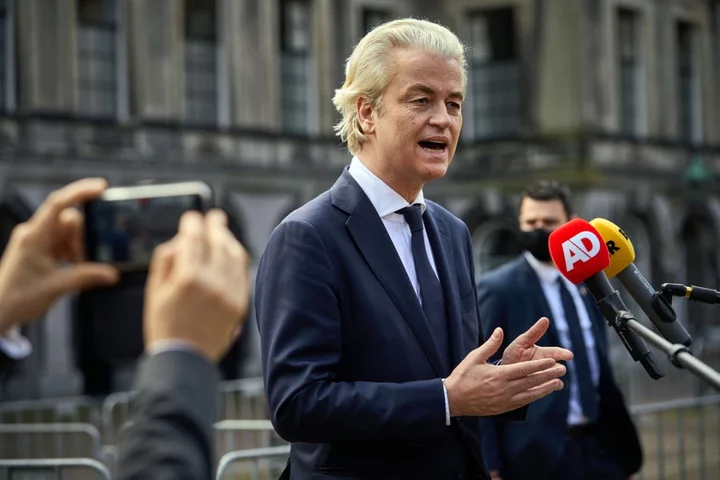Dutch far-right populist Geert Wilders, who has vowed to stop all immigration to the Netherlands, was heading for a landslide victory in parliamentary elections on Wednesday, in one of the biggest political upsets in Dutch politics since the second world war.
A win by Mr Wilders, sometimes dubbed the Dutch Donald Trump and who has previously urged his country to leave the EU, would send shockwaves through Europe.
The result puts the anti-Islam politician in line to lead talks to form a new ruling coalition and possibly become the country’s prime minister at a time of political upheaval through much of Europe.
As voting closed, the Ipsos poll put his Freedom party (PVV) at 35 out of 150 seats, nine seats ahead of the closest rival, Frans Timmermans’ Labour/Green Left combination, and more than double the 17 seats he won at the last election.
The party of outgoing prime minister Mark Rutte, the conservative VVD, was in third place at 23 seats, the exit poll showed.
Political parties from the left to the far-right PVV are competing to secure a leading position in the Dutch parliament.
Immigration – the issue that triggered the collapse of Mr Rutte’s cabinet after 13 years in power – has been a key issue in the campaign.
Mr Rutte was the country’s longest-serving prime minister, but has faced a decline in his popularity.
Mr Wilders’ election programme calls for a referendum on the Netherlands leaving the European Union, a total halt to accepting asylum-seekers and migrant pushbacks at the Dutch borders.
The populist with dyed blonde hair said in a television debate during the election campaign: “It’s been enough now. The Netherlands can’t take it any more. We have to think about our own people first now. Borders closed. Zero asylum seekers.”
A self-proclaimed fan of Hungary’s far-right Victor Orban, Mr Wilders is also explicitly anti-EU, urging the Netherlands to significantly reduce its payments to the bloc, and to stop the entry of any new members.
He has also repeatedly said the country should stop providing arms to Ukraine, saying it needs the weapons to be able to defend itself.
However, none of the parties he could potentially form a government with shares these ideas.
In 2016, he said he wanted to ban all Islamic symbols, mosques and the Quran, although in this election campaign he has been seeking to soften his image in the hope of entering government, which some voters said they liked.
He said recently that opposing Islam remained at his party’s core but concerns over the cost of living, improving care for the elderly and limiting immigration were what he focused on now.
His enduring popularity since he created PVV in 2006 has pushed ruling parties over the years to give the Netherlands one of Europe’s toughest immigration policies.
Abroad, his comments about the prophet Mohammed and calls for the Quran to be banned led to sometimes violent protests in countries including Pakistan, Indonesia and Egypt. He was convicted of discrimination after insulting Moroccans at a campaign rally in 2014.
Death threats against him mean he has lived under heavy police protection for years.
Read MoreThe top contenders to lead the Netherlands, from a former refugee to an anti-Islam populist
An election to replace the longest-serving leader of the Netherlands gives voters a clean slate
Netherlands election: Polls open in neck-and-neck race to decide next Dutch leader
Dutch political leaders campaign on final day before general election that will usher in new leader
Potential kingmaker in Dutch coalition talks comes out against anti-Islam firebrand Wilders
Dutch election candidates make migration a key campaign issue in the crowded Netherlands

